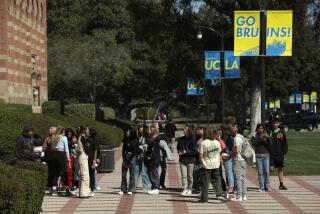Classes in Cyprus to continue
- Share via
Opponents of a San Diego State student exchange program on Cyprus were disappointed Wednesday when the Cal State system’s trustees did not suspend the overseas classes.
Greek American organizations and others had sought to stop the summer program about international conflict resolution because it was held last summer in the Turkish-occupied part of Cyprus, which they said amounted to immoral support of a puppet regime.
The classes’ organizers and other faculty stressed that the U.S. State Department had commended the program at Eastern Mediterranean University and that a move to kill it would violate academic freedom.
Last month, a committee of Cal State trustees that had examined the controversy declined to end the program and instead asked system Chancellor Charles B. Reed to develop new rules for study abroad. On Wednesday, the full board of trustees, meeting at system headquarters in Long Beach, concurred.
Reed last week issued guidelines that prohibited classes from being held in a country with a State Department travel warning, unless excepted by the chancellor, and required that students be informed in advance about health, safety or political restrictions.
Ken Kassakhian, executive director of the American Hellenic Council of California, said he was disappointed the trustees did not suspend the program. But he said his group “will continue to express our discontent.”
Stacey Sinclair, the San Diego State professor who organized last summer’s inaugural classes for 26 students, said that plans were underway to return this summer. While headquartered in northern Cyprus, the program also brought participants to the island’s southern portion to study the dispute, she noted.
In 1974, Turkey invaded Cyprus in response to a coup by Greek Cypriots seeking the island’s union with Greece. Massive displacement followed, and the United States and much of the international community do not recognize the Turkish-administered northern part of the island.
More to Read
Sign up for Essential California
The most important California stories and recommendations in your inbox every morning.
You may occasionally receive promotional content from the Los Angeles Times.











